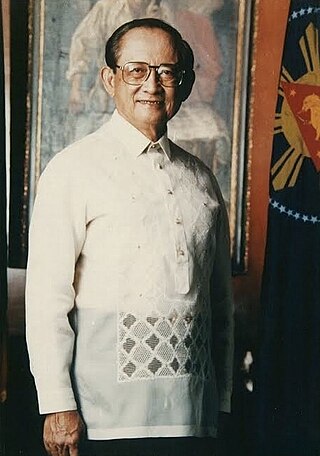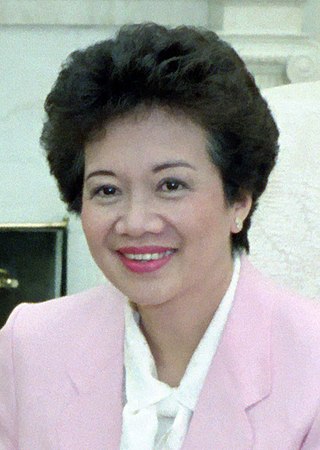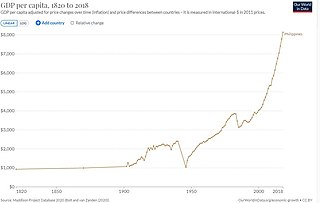Related Research Articles

Fidel Valdez Ramos, popularly known as FVR, was a Filipino general and politician who served as the 12th president of the Philippines from 1992 to 1998. He was the only career military officer, who reached the rank of five-star general/admiral de jure. Rising from second lieutenant to commander-in-chief of the armed forces, Ramos is credited for revitalizing and renewing international confidence in the Philippine economy during his six years in office.

San Miguel Corporation, abbreviated as SMC, is a Philippine multinational conglomerate with headquarters in Mandaluyong, Metro Manila. The company is one of the largest and most diversified conglomerates in the Philippines. Originally founded in 1890 as a brewery, San Miguel has ventured beyond its core business, with investments in various sectors such as food and drink, finance, infrastructure, oil and energy, transportation, and real estate.

Japan–Philippines relations span a period from before the 16th century to the present. According to a 2011 BBC World Service Poll, 84% of Filipinos view Japan's influence positively, with 12% expressing a negative view, making the Philippines one of the most pro-Japanese countries in the world.

The Department of Budget and Management is an executive body under the Office of the President of the Philippines. It is responsible for the sound and efficient use of government resources for national development and also as an instrument for the meeting of national socio-economic and political development goals.

The Department of Foreign Affairs is the executive department of the Philippine government tasked to contribute to the enhancement of national security, protection of the territorial integrity and national sovereignty, to participate in the national endeavor of sustaining development and enhancing the Philippines' competitive edge, to protect the rights and promote the welfare of Filipinos overseas and to mobilize them as partners in national development, to project a positive image of the Philippines, and to increase international understanding of Philippine culture for mutually-beneficial relations with other countries.

The Department of Transportation is the executive department of the Philippine government responsible for the maintenance and expansion of viable, efficient, and dependable transportation systems as effective instruments for national recovery and economic progress. It is responsible for the country's land, air, and sea communications infrastructure.

This article covers the history of the current Philippine republican state following the 1986 People Power Revolution, known as the Fifth Philippine Republic.

The Presidential Communications Group, or simply the Communications Group, is the collective name for the offices within the Office of the President of the Philippines and refers to the position of the Secretary of Presidential Communications Office formerly known as Office of the Press Secretary and the Secretary of the Presidential Communications Operations Office (PCOO). The office of the presidential spokesperson was previously under the Communications Group.

The National Defense College of the Philippines (NDCP) is an educational, training, and research agency of the Philippine government located inside Camp General Emilio Aguinaldo, Quezon City. It is responsible for providing continued and intensive studies of the diverse problems relating to national defense and security. It is under the Department of National Defense.

Philippines–United States relations are the bilateral and diplomatic relations of the Republic of the Philippines and the United States of America. The relationship has been historically strong, described by some as a "special relationship" as a consequence of the Philippines' American colonial period between 1898 and 1946. Former Philippine president Rodrigo Duterte, however, was supportive of a foreign policy less dependent on the United States, favoring one that prioritized closer relations with China and Russia, despite the Philippines and the U.S. having a mutual defense treaty dating from 1951 to the present. In 2014, the countries signed an enhanced defense cooperation agreement that began its first phase of implementation in 2019.

Philippines–Romania relations are foreign relations between the Philippines and Romania.

The presidency of Fidel V. Ramos, also known as the Ramos administration spanned for six years from June 30, 1992, to June 30, 1998. Ramos is the first Protestant president of the country, and the first Christian Democrat to be elected, being the founder of Lakas-CMD. He was included as one of the most influential leaders and the unofficial spokesman of liberal democracy in Asia.

Corazon Aquino became the 11th President of the Philippines following the People Power Revolution or EDSA 1, and spanned a six-year period from February 25, 1986, to June 30, 1992. Aquino's relatively peaceful ascension to the Philippine presidency signaled the end of authoritarian rule of Ferdinand Marcos in the Philippines, and drew her and the Filipino people international acclaim and admiration.

The presidential transition of Benigno Aquino III began when he won the 2010 Philippine presidential election. On June 9, 2010, at the Batasang Pambansa Complex, in Quezon City, the Congress of the Philippines proclaimed Aquino as the president-elect of the Philippines, following the 2010 election with 15,208,678 votes, while Jejomar Binay, the former mayor of Makati, was proclaimed as the vice president-elect of the Philippines with 14,645,574 votes, defeating runner-up for the vice presidency Mar Roxas, the standard-bearer of the Liberal Party for vice president.

The economic history of the Philippines chronicles the long history of economic policies in the nation over the years.
The Marcos Japanese ODA Scandal, referred to in Japan simply as the Marukosu giwaku (マルコス疑惑), or "Marcos scandal", refers to incidents of alleged corruption linked to Japanese Official Development Assistance (ODA) to the Philippines during Philippine president Ferdinand Marcos' administration.
Religious sector opposition against the dictatorship of President Ferdinand Marcos included leaders and workers belonging to different beliefs and denominations.
Certain associates of former Philippine President Ferdinand Marcos, historically referred to using the catchphrase "Marcos cronies", benefited from their friendship with Marcos – whether in terms of legal assistance, political favors, or facilitation of business monopolies, during his administration. Marcos critics, and the local and international press began referring to these individuals as "cronies" during the latter days of the Marcos dictatorship, and the Philippine government – especially the Presidential Commission on Good Government (PCGG) – continued using the term after the ouster of Marcos in 1986.

Aileen San Pablo-Baviera was a Filipino political scientist and sinologist. She was one of the leading China experts in her country.

Bienvenido Estudillo Laguesma is a Filipino government official, lawyer and businessman who is currently the Secretary of Labor and Employment under the Marcos Jr. administration since June 30, 2022.
References
- 1 2 3 4 5 Severino, Howie (2020-05-04). "Howie Severino: Remembering four friends, victims of COVID-19". GMA News and Public Affairs. Retrieved 2020-05-12.
- 1 2 3 Paddock, Richard C. (2020-04-10). "Alan T. Ortiz, a Veteran of Philippine Government and Business, Dies at 66". The New York Times. ISSN 0362-4331 . Retrieved 2020-05-12.
- 1 2 3 4 5 6 7 8 9 10 11 12 13 14 15 Lirio, Gerry (2020-03-23). "Alan Ortiz: 'Goodbye to a good old, reliable public servant'". ABS CBN News and Public Affairs. Retrieved 2020-05-12.
- 1 2 3 4 5 Solitario, J. Mikhail. "IN MEMORIAM: Remembering those we have lost". University of the Philippines (University Website). UP Media and Public Relations Office. Retrieved 2020-05-12.
- 1 2 3 4 5 "Dr. Alan T. Ortiz". Philippine Science High School System (PSHS System Website). Retrieved 2020-05-12.[ permanent dead link ]
- ↑ Oplas, Bienvenido Jr. (2017-03-08). "How the bureaucracy works against cheap and stable electricity". Business World .